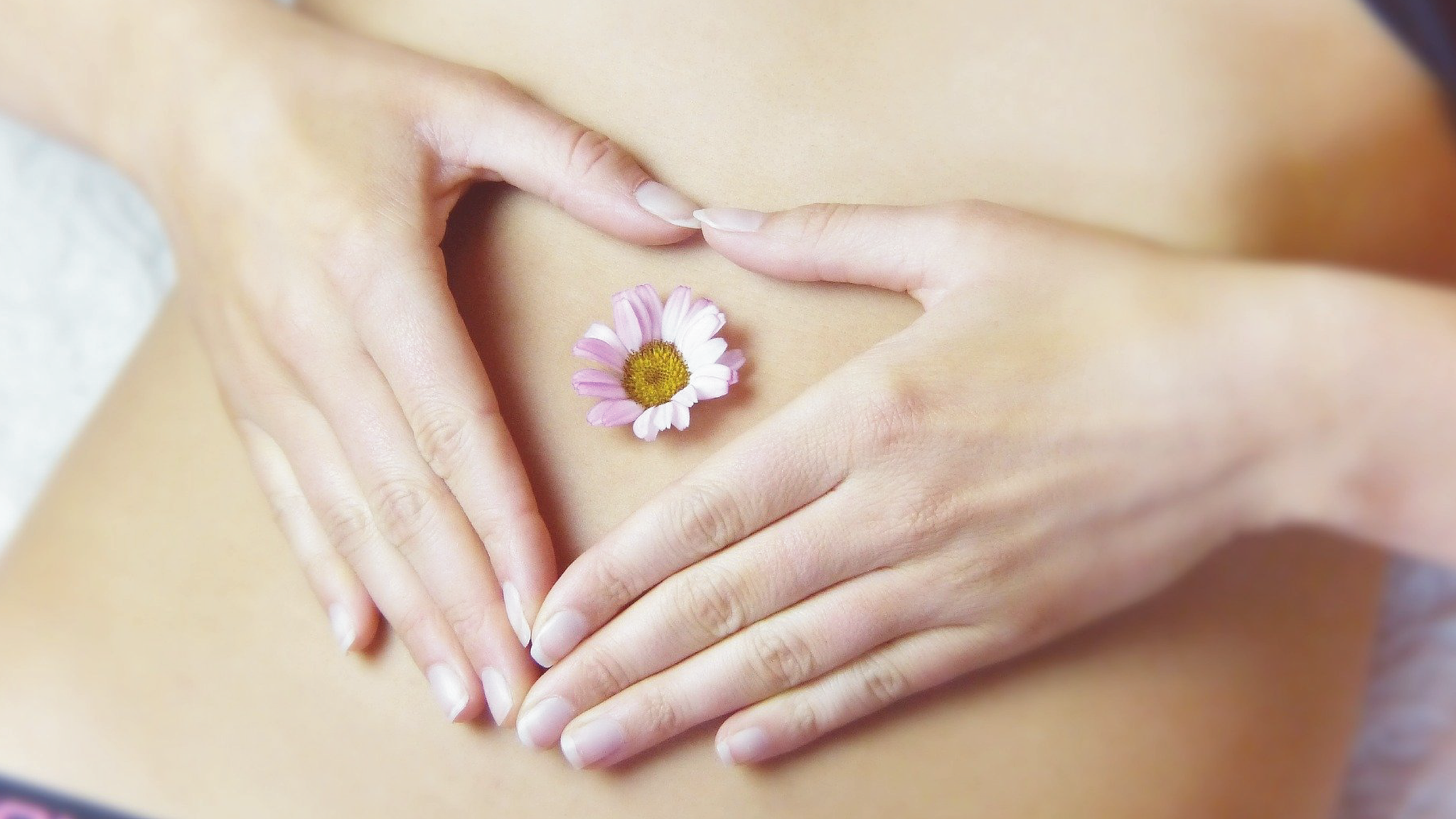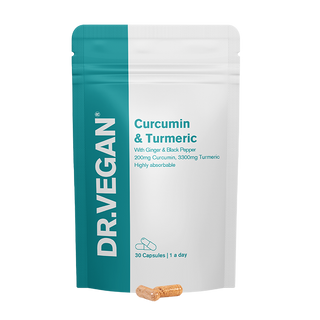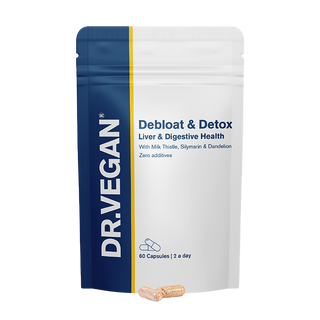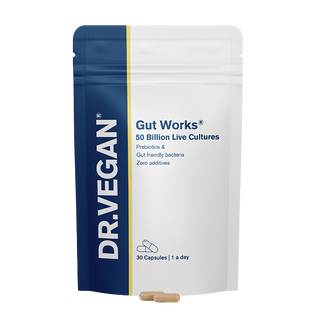7 Best Foods to Help you Debloat: Vegan Bloating Remedies

Bloating is uncomfortable, embarrassing and down-right annoying. And it's very common. A consumer survey by DR.VEGAN® shows half of us suffer digestion and bloating issues, and more than one in four of us suffer IBS, of which bloating is a common symptom*.
There are many factors that cause bloating and digestive discomfort such as food sensitivities, digestive disorders and diet. Whilst plant-based diets are rich in some vitamins and minerals, they can be lower in other nutrients such as Vitamin B12, Calcium and Zinc that aid healthy digestion. Eating foods rich in these nutrients and taking debloating supplements can help to relieve the symptoms of digestive discomfort.
Best Foods for Debloating
Here our nutritionists explain the best foods for digestion to help you reduce that bloated feeling.
1. Yoghurts and Fermented Foods
Are yoghurts good for the gut? Yes! Naturally fermented foods such as probiotic yoghurts are great for combatting bloating, but what does probiotic mean?
Probiotics are healthy bacteria that grow in foods which are left to ferment. These foods include:
- Yoghurts (including plant-based yoghurts)
- Sauerkraut (fermented cabbage)
- Tempeh (fermented soya beans)
- Kombucha (fermented tea).
Checkout our delicious frozen yoghurt fitness bar recipe.
When these foods are consumed, the probiotics reach the gut where they promote the digestion of foods and help to prevent bloating. Probiotics also promote regular bowel movements, further promoting gut health.
Learn more in 'What are probiotics' and read our blog 'How to look after your gut through your diet'.
2. Green Tea
Green tea is a healthy alternative to standard black tea and full of antioxidants which can help to protect your body from harmful free radicals.
Green tea contains small amounts of caffeine which stimulates the digestive tract and promotes regular bowel movements, which in turn help to reduce bloating.
3. Ginger
Ginger is a well known root vegetable used for digestive issues. Ginger helps with the speed at which the stomach empties and increasing the rate of stomach emptying can decrease bloating that occurs after eating, and reduce feelings of fullness and discomfort.
Ginger has another benefit - it contains an enzyme called 'zingibain' which helps with the digestion of protein and supports a comfortable digestion.
Understand your diet. Create your free Diet Profile.
4. Papaya
Papaya is a great tasting tropical fruit with excellent benefits for digestion.
Papaya contains an enzyme called 'papain' which helps to break-down protein and make digestion more comfortable, helping prevent bloating. Papaya can be consumed fresh or dried and provides many nutrients and fibre. (Caution – papaya is not recommended for pregnant women).
5. Oats
Oats are a superfood for the gut. Oats contain lots of fibre, including a specific type of fibre called 'beta glucans'. Beta glucans have many benefits across the body, including reducing cholesterol levels and lowering inflammation.
Fibre promotes a normal and comfortable digestive process, so starting your day with an oat-based breakfast such as porridge or soaked oats is a great start for your gut.
Discover our Exotic Fruit Oatmeal breakfast recipe.
6. Gluten-free Grains
Gluten can cause a heap of digestive issues for many people. Even when gluten sensitivity is not present, gluten may trigger bloating and discomfort. Learn more in 'Signs of gluten intolerance'.
Gluten free grains such as whole grain rice and quinoa provide fibre and carbohydrates without the complications of gluten. Try to avoid buying overly processed gluten-free foods and focus on making higher quality gluten-free foods at home.
You may also enjoy our blog: 5 best carbs for plant-based meals.
7. Apples
There is more to apples than just fibre and vitamins. "An apple a day keeps the doctor away" – or so the saying goes!
Apples contain 'pectin', a substance which holds water and helps to move food along the gut. Pectin supports regular bowel movements and a reduction in bloating.
Curcumin & Turmeric

In addition to the benefits of pectin, apples (especially the core) contain probiotics which benefit your gut, and the fibre of apples feeds the probiotics in your gut, both helping promote a decrease in bloating. There are many ways to eat apples however if you want maximum benefit from the probiotics, they are best eaten raw and try to eat as much of the core as possible.
Best Supplements for Bloating
Curcumin & Turmeric
Turmeric is a brightly coloured root used in cooking with powerful benefits. Turmeric contains a compound called Curcumin which has anti-inflammatory actions in the body. Curcumin has positive and anti-inflammatory effects on digestion and reduces gas, bloating, constipation and provides IBS support.
Curcumin is not very well absorbed on its own, but when combined with ginger and black pepper its absorption capabilities are dramatically increased, ensuring you benefit from the active compounds.
Probiotics
Probiotics are the good bacteria that live in our gut, and our body is home to trillions of probiotics. They are important for many reasons and low levels of probiotics can lead to digestive discomfort, IBS and bloating, as well as fatigue, insomnia, and poor skin. Learn more in 'Common and unusual symptoms of IBS'.
Probiotics help to crowd out unwanted bacteria and yeasts, and they produce over 200 digestive enzymes that assist with the breakdown of foods. They also promote regular bowel movements and synthesise nutrients which are beneficial to the body. The number of probiotics in the gut can be decreased by the use of antibiotics, stress and a poor diet, so it's important to build and maintain healthy, active probiotics in your gut through diet and supplements.
You may also enjoy our blog How to look after your gut through your diet.
Inulin
Inulin is a prebiotic fibre which feeds healthy, active bacteria (probiotics). The body cannot not digest inulin itself but inulin still provides benefits - the probiotic bacteria in your gut rely on good quality fibre such as inulin as a food source to multiply and thrive. The multiplication of the probiotics in our gut enhances our digestion to reduce the risk of bloating.
Vitamins That Help with Bloating
Like any type of diet, plant-based diets have the potential to be higher in certain nutrients like Vitamin C and folate, and lower in other nutrients such as Vitamin B12, Calcium and Zinc, all of which are important for healthy digestion.
Vitamin B12
It is important for any vegans or those on a plant-based diet to take a Vitamin B12 supplement as Vitamin B12 is only found in animal foods and in very small quantities in yeast.
Some foods often consumed by those on a plant-based diet such as seaweed and some types of algae contain pseudo Vitamin B12. This is similar to Vitamin B12, but it has no functional use in the body. Pseudo Vitamin B12 competes for absorption with real B12 and can contribute towards B12 deficiency.
Read our blog '5 signs you may be low in Vitamin B12'.
Debloat & Detox

Calcium
Everyone knows that calcium is needed for bones, but did you know that Calcium is also needed for digestive enzymes?
A deficiency in calcium can seriously impair digestion. Calcium is found in some plant foods, however some vegans may need to top themselves up with a daily supplement, either on its own or as part of a multi-nutrient formula.
Discover our Bone & Muscle Support with Calcium.
Zinc
Zinc is another nutrient that plant-based individuals can struggle to get enough of. Although Zinc is found in plant-based foods, the extra fibre consumed on a pant-based diet can inhibit absorption.
Summary
Consuming a multivitamin and mineral supplement is an insurance policy to prevent any nutrient deficiencies. Vitamin B12, Calcium, Zinc and Vitamin D which can also be low on a vegan diet, can all be taken as part of a vegan Daily Multi-Vitamin formula.
Discover our Debloat & Detox supplement, the #1 best-selling formula to relieve abdominal bloating and digestive discomfort that naturally detoxifies your liver.
*Based on a UK survey conducted by DR.VEGAN® of 251 customers, nationally representative, during August & September 2022. All customer survey findings reflect our own efforts and have not been influenced or verified by any external organisations or third-party entities.
Want to hear more from our nutritionists? Sign up to our email newsletter for insights and exclusive offers:





















